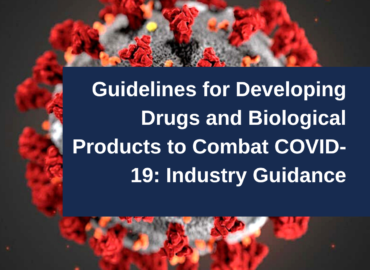Comprehensive Guidelines for the Development of Drugs and Biological Products to Combat COVID-19: Industry Insights
The FDA’s recommendations concentrate on phases 2 and 3 trials, encompassing critical elements such as trial population, design, efficacy endpoints, safety considerations, and statistical aspects. In the case of biological products, including cellular and gene therapies and blood products, sponsors are urged to collaborate with the pertinent review division.
Understanding the Challenge:COVID-19, originating from the SARS-CoV-2 virus, manifests a range of severity, from mild to critical conditions such as pneumonia, severe acute respiratory syndrome, multi-organ failure, and mortality. Asymptomatic infection is also a potential outcome.

Discussion:
- Treatment Trials
- Population For sponsors developing drugs for COVID-19 treatment, careful consideration should be given to the following:
- Tailor the enrolled population to align with the intended product use, encompassing non-hospitalized individuals at standard or high risk, as well as hospitalized individuals with varying respiratory needs.
- Document the diagnosis of laboratory-confirmed SARS-CoV-2 and the duration of symptoms before treatment.
- Categorize baseline severity of COVID-19 using objective measures, with examples provided in Appendix A.
- Trials focusing on preventing serious outcomes should include high-risk groups.
- Ensure representation of older adults, particularly those aged 75 and above, in relevant clinical trials. Consider conducting trials in nursing homes or eldercare facilities.
- Promote diversity in clinical trial populations, including individuals from underrepresented racial and ethnic groups.
- Conduct studies on extrinsic and intrinsic factors’ effects on drug pharmacokinetics early in development, incorporating recommendations from relevant industry guidance’s.
- Apply these principles to guide drug development for children, pregnant, and lactating individuals, necessitating clinical trial data generation for these populations.
- Trial Design and Conduct Sponsors should adhere to the following considerations when designing and conducting trials for COVID-19 treatment drugs:
- FDA strongly recommends randomized, controlled, double-blind clinical trials, typically designed as placebo-controlled superiority studies.
- Consider add-on placebo designs to maintain equipoise, especially for drugs with a similar mechanism of action as the background standard of care.
- For agents with comparable mechanisms of action, active-comparator controlled study designs may be appropriate, considering superiority or noninferiority trial designs.
- Employ quantitative clinical pharmacology approaches for dosing regimen selection, leveraging all available information.
- Collect baseline vaccination status, monitor changes during the trial, and document baseline and concomitant medication use, including COVID-19 standard of care therapies.
- Address potential drug and COVID-19 vaccine interactions, particularly for drugs impacting vaccine effectiveness.
- Account for the evolving nature of SARS-CoV-2 by determining antiviral activity against current and emerging U.S. variants, considering EC50 and EC90 values.
These guidelines present a comprehensive framework for sponsors involved in the development of drugs for COVID-19 treatment, emphasizing the importance of a diverse, representative trial population and robust trial design to ensure the efficacy and safety of interventions amidst evolving viral challenges.

